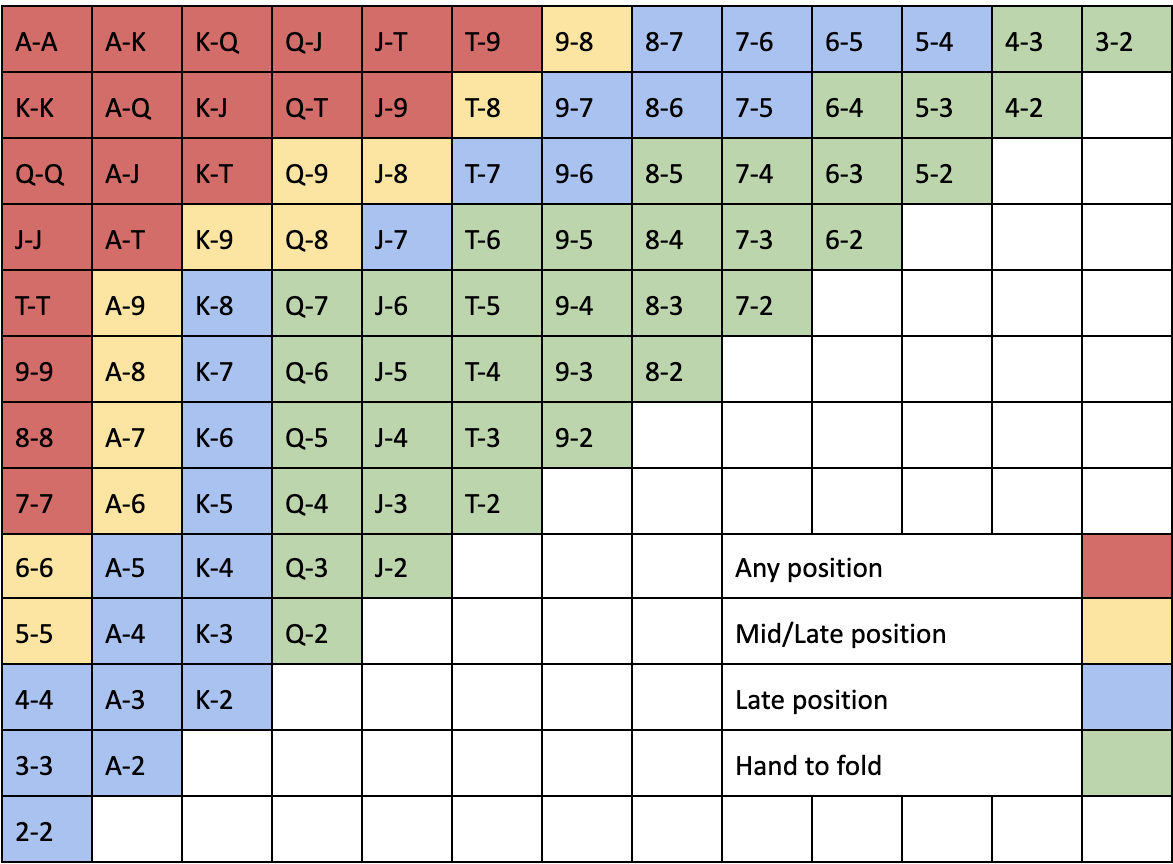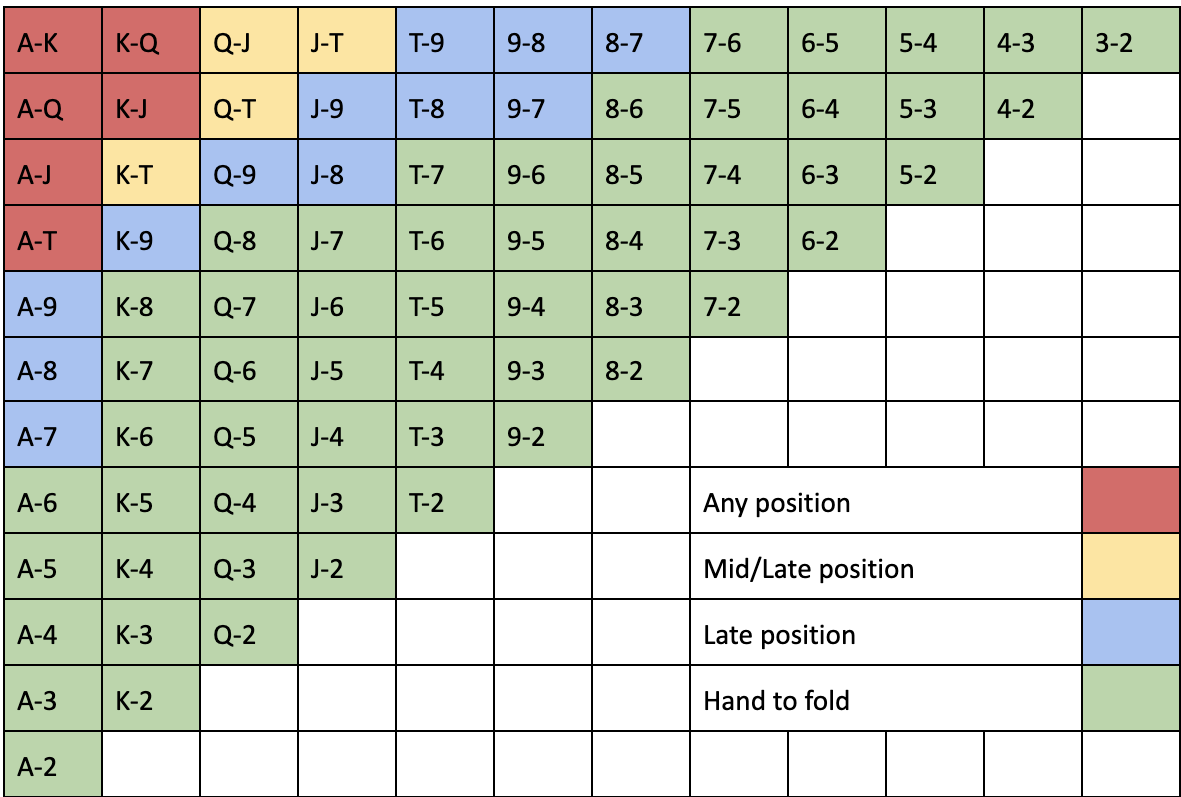Poker is a legendary game that thousands of players have turned into a lucrative hobby — and even a professional career. Online poker is a fantastic way to get to know the poker game from the comfort of your home. When playing online, you can choose your stakes: from freerolls to high-roller tournaments.
Online poker players earn impressive sums, and the names of the most successful players are well-known outside the poker community. Is there a success secret behind it? Read ahead to find out the best tips on playing online poker to your benefit! You can also get a casino bonus at Parimatch.
Table of Contents
Know Poker Hands’ Order and Value
Before sitting at the poker game table, you must remember what combinations (or “hands”) exist in poker
There are ten standard combinations universal for all poker variations.
| Hand | Example | Description | |
| 1 | Royal Flush | ♥A♥K♥Q♥J♥10 | The strongest poker hand. It consists of five cards of the same suit, ranging from ten to ace. All suits in poker are equal, so a royal flush of hearts is equal to spades, clubs, and diamonds. |
| 2 | Straight Flush | ♣5♣6♣7♣8♣9 | These are five consecutive cards of the same suit — for example, a straight flush to a queen. If two or more players have a straight flush, the one with the highest card wins. For example, a straight flush to a queen beats a straight flush to a jack. |
| 3 | Four of a Kind | ♥K♣K♠K♦K♣T | This poker hand contains four cards of the same rank. If two or more players have collected four of a kind, the one whose cards are higher in rank wins (ex., four 9 > four 8). If several players have collected four of a kind of the same rank (this can happen when four cards of the same rank appear on the table), then the one with the higher fifth card wins (ex., four 8 + 5 < four 8 + K). |
| 4 | Full House | ♥A♣A♠A♦8♣8 | This is any three cards of the same rank and a pair of two other cards. In case of equal combinations, the player with the higher three cards from the “full house” wins. In the case of equal cards, the pairs need ranking. In the case of complete equality, the win divides between the players. |
| 5 | Flush | ♣Q♣8♣6♣4♣3 | It is any five cards of the same suit in any order. The highest card in hand determines the overall value of the flush. |
| 6 | Straight | ♦2♣3♠4♦5♣6 | It is any five consecutive cards of different rank stripes. Ace can be considered both the highest and the lowest card. |
| 7 | Three of a Kind | ♣J♥J♠J♣5♦8 | This is any three cards of the same rank. |
| 8 | Two-Pair | ♦T♣T♠6♣6♦K | This is two pairs of cards of the same rank. When two players have this combination, the winner owns the pair of the highest cards. |
| 9 | One-Pair | ♥A♣A♠8♥6♦2 | It is any two cards of the same rank. Our example shows the best possible pair. |
| 10 | High-Card | ♥K♠J♣T♥6♦3 | This is any hand without any of the mentioned combinations. |
How to Play Texas Hold’em Poker
Hold ’em poker has limited and unlimited formats. The limit game has certain restrictions, so the players cannot bet as much as they want, whereas the latter variation, Texas Holdem, does not impose such limits.
At the same time, these texas hold’em types differ not only in the bet limits: each variation has its game strategy, which is different from the others. In this article, we will focus on Texas hold ’em as it is currently the most popular poker variation and the main discipline of the world’s key tournaments.
Here are the key steps to play Texas Holdem:
- Each player receives two face-down hole cards.
- The players then use one, both, or neither of their pair of cards to make combinations with the five community cards.
- The goal is to have the best hand or to make all other players fold.
- Betting is allowed at any moment throughout the four betting rounds.
The rules of Texas Holdem may seem simple, yet the game of no-limit hold ‘em is extremely thrilling.
Other Poker Game Variations
Some experienced players choose to play only one cash game variation, while others succeed in various poker types. The variation you choose depends solely on individual preferences. If you are unsure which type suits you best, look at the most interesting poker types’ brief descriptions:
- Pot Limit Omaha Poker. There are four-hole and five community cards in the game. High combinations are common as well. The winner is determined at the showdown or during the betting rounds.
- Omaha Hi-Low. A modified variation of Omaha with the same rules, except that in addition to high hands, lows are also compiled – five cards of the lowest rank, not higher than eight. One player can make both types of hands and take the full pot — the perfect outcome of the hand. Otherwise, the pot splits in half between the players with the winning High hand and the strongest Low.
- Crazy Pineapple. This popular poker game differs from the regular Pineapple in the period of discarding the third card. Originally, players get rid of the third card pre-flop. In the Crazy Pineapple variation, before the start of the third round.
- Hold ’em++. The players aim to collect the best five-card hand using community and hole cards in any combination. The one with the best hand wins the pot.
- 2-7 Triple Draw. It is a limited game; each player receives five cards face down. Then, a betting round takes place. At the end of the betting, the first round of exchange begins. You can exchange up to five cards. In total, there are three betting and exchange rounds in the game.
- Badugi. It is a four-card discipline similar to others in terms of betting rules. The players use only pocket cards to make an exchange three times. If a player cannot take the pot throughout the betting rounds, you must show the smallest Low at the showdown. Paired and suited cards decrease the strength of the hand, and you should strive to keep your hand as low as possible.
- Short Deck Hold’em or Six-Plus Hold’em. It is a variation of Texas hold ‘em without cards from 2 to 5 playing. Each player receives a pair of cards face down and tries to make the best five-card hand from any of the seven-card combinations.
If you are up for more exotic poker variants, you should learn about seven-card poker real money games and their rules. Razz and Stud are especially popular, as well as the modification of the latter — Stud Hi-Lo. In all these games, poker players have seven personal cards in five stages. The player does not show the rest of the participants, only the first two and the last cards, while the other four are visible to the entire table. Betting rounds during five stages took part to form the bank and knock out opponents before the showdown. The differences between the disciplines are as follows:
- 7-Card Stud. High hands are similar to hold ’em and Omaha variations.
- 7-Card Stud Hi-Lo. It includes both types of hands, but Low can only be up to eight and includes an ace.
- Razz. It includes only Lows. At the same time, players can use the whole deck to compose them, and the ace is always the lowest in rank.
Now that you know some fascinating poker variations, practice playing live poker at Parimatch!
What Are the Poker Game Rules?
Understanding poker’s basic rules are the best place to start. We suggest you familiarize yourself with the classic rules of Texas poker right now. Texas hold ’em combinations and rules generally apply to most poker variations with slight adjustments.
Each player in Texas hold’em deals with two cards. After the card distribution, trading begins, which takes place in several rounds. Here are the other poker rules and how the game continues:
Blinds
The two players to the left of the dealer place mandatory bets, which are charged even before the beginning of the game. It encourages active play. These compulsory bets are called blinds.
A player first to the left of the button can execute a small blind. The big blind in poker belongs to whoever is next in line to the dealer’s left.
Pre-Flop
Preflop begins right after the players receive hole cards and the community cards on the table are unrevealed.
The blinds form the pot for which the fight in the pre-flop begins. During this betting round, the players decide what to do with their hole cards: fold, call, or raise. The first person to decide pre-flop is the player to the left of the big blind. The last person to decide pre-flop is the big blind.
Players base the pre-flop decisions on hole cards, their position, and the opponents’ actions before them.
Flop
The flop is the second round of betting in online poker, in which three community cards appear on the table that all the remaining players can use to make their best hand. It is one of the vital moments that can significantly change the balance of power at the table.
A correct understanding of the flop strategy allows you to put significant pressure on other players or, on the contrary, makes you refuse to play further in situations where your opponents are likely to strengthen their hands.
Turn
Many experts agree that the turn is the hardest part of Texas hold’em. It can be unpredictable, especially in no-limit poker. For instance, if you have good cards and everything goes well, the turn can change everything.
The main principle in this betting round is to bet a lot, if you bet at all. You should almost always follow this principle except in two situations:
- when paired cards are on the table (for example, Q-Q-4);
- when you have no draw hint during flop.
River
The river is the fifth and last community card on the board in the distribution and the fourth, final round of betting in Texas hold ‘em, Omaha, and several other poker games. It is on the River that the last betting round takes place, after which the showdown begins — all players show their cards and determine the winner. The River is also the last chance to make the right combination for a player with any draw.
Actions in Poker
The behavior of the players at the poker game table is made up of the words and actions that the players choose during the game:
- Check. The players say this word when they don’t want to bet. If all players refuse to make the first bet, a replay occurs, or the next betting interval starts
- Bet. The players use this word to make the first wager in any round. It is wise to open the game when being sure that your cards are more powerful than the cards of other players, yet bluffing is allowed.
- Сall. The player says this word when making a bet equal to the previous opponent’s bet.
- Raise. Use this word when making a larger bet than the one of the previous player.
- Fold. This term is for situations when you don’t want to make another bet. In this case, the player discards all cards and loses the right to continue the game or claim to win.
What Are The Blinds and Dealer Buttons?
As explained previously, a blind bet is a mandatory and integral element in most poker variants, including Omaha, Texas hold ’em, Draw poker, Badugi, and Lowball. Traditionally, there are two blinds: the big and the small.
The turn to be the blind is determined clockwise from the dealer’s position. It is essential to remember that the dealer’s position changes with each hand — it also moves clockwise. Each player at the table will have the dealer button and place both blind bet types throughout the game.
Poker Game Example
Suppose you are playing $2/$4 Texas hold’em, entering the game after the opponent with a big blind ($4). The choice is yours: call, raise, or fold.
Let’s assume you are holding a ♦K ♥K. It’s not a bad idea to raise the bet to $8. The opponent folds, while the player with the big blind calls adds $4.
The flop is ♠9 ♥9 ♣K. For the player with the big blind, there are two options: to check or to bet. The opponent decides to check while you bet another $12 with a guaranteed Full House combination.
The big blind player calls, and the ♠K turn. Your opponent checks once again while you bet $30 with your Four of a Kind and a pair. After the big blind calls again, the River is completed with a ♥7.
Then, your opponent checks yet again while you bet $150. Then, you show cards with a Four of a Kind combo and a pair of nines, whereas your opponent has managed to collect a Two Pair hand of ♠9 ♥9 ♥7 ♣7.
What an amazing lucky poker game for you! You win a nice pot with your strong hand. Very well-played!
Can There be a Tie in a Poker Game?
A draw in poker games is also called Split — this translates as division. In the event of a tie, the bank in the distribution will be divided between users. Here are some things to remember about a draw in poker:
- It can only occur at a showdown;
- A draw occurs when several players have made the same combination;
- It doesn’t matter whether the players used the hole or community cards to form them.
In such situations, many players begin to understand the meaning of the kicker in the game. This card is not in the main hand — but it can decide whether you win a particular hand with a draw-in poker.
Here is how to deal with a tie-like situation in poker:
|
Full house over full house When two opponents have a full house, the highest three-of-a-kind wins. |
|
|
Flush over flush When two opponents have a flush, the highest flush wins. |
Straight over straight When two opponents have a Straight, the highest Straight wins. |
|
Trips over trips When two opponents have a three-of-a-kind, the highest three-of-a-kind wins. |
Two-pair When two opponents have a two-pair, the highest pair wins. |
| One-pair
When two opponents have one pair, the highest pair wins. |
High-card When two opponents have a high card, the highest card wins. |
How to Win a Poker Game: Analyze and Count Cards
#poker #pokeronline #pokerplayer","tags":["casino","poker"]}
A player who can count cards in poker games has a significant advantage. At the initial stage, it is already possible to make a calculation and understand your chances of collecting a winning combination.
For this, we use the knowledge of probabilities and simple calculations. The player must understand whether the desired card will open during the subsequent streets and whether it is worth hoping for a poker combination that needs to be collected.
If the player realizes that the chances of making a poker hand combination are rather small, it is not desirable to make a large bet, saving your budget in the long term.
Analyze your Hand
Texas hold ’em has 169 variants of the two-card combinations that come into play. The stronger your starting hand is, the fewer difficult decisions you will face during the game. Here is a sheet demonstrating what combinations are favorable for the beginning of the Texas Hold’em game and which are not.
Paired and suited cards

Unsuited cards

How to Count Cards in Poker
When learning how to count cards in poker games, it is essential to know what an “out” in poker is. An out is an undrawn card that potentially can close a high hand. For example, if you need 4 cards to have a Straight, you have 4 outs. Sometimes cards revealed on the board give outs for 2 high combinations at once. Then the chances of winning will be much higher.
First, the player must understand the realistic combination to count on during a particular game. After that, he has to carry out the analysis of the outs.
Using these values for counting cards in poker is important:
- There are 4 suites on the deck. Each suite has 13 cards.
- There are 52 cards in the deck.
- There are only 4 cards with the same value in the deck. For example, there are only 4 Kings or 4 Queens in the deck.
Knowing the basic information about all the cards, you need to analyze the specific game situation by:
- Counting cards of the required value on the table and in your hand;
- Realizing how many suited cards are on the table and in your hand.
Suppose you have ♣K ♦Q. The flop opened ♠J ♥10 ♠2. You analyze and see that you have a Straight Draw (an incomplete Straight with one out). To improve the combination, you need an ace (4 cards in a deck) or a 9 (4 cards in a deck). In total, you have 8 outs for a high combination. There are 52 cards in the deck. You subtract 2 of your cards and 3 previously revealed during the flop. Thus, you are waiting for the 8 necessary outs from the 47 remaining cards.
If you figured out how to count cards in the poker game, you could move on to determining the probabilities. You can determine your chances of winning as a percentage based on the calculated number of outs.
The simple formula for quick calculation:
- If you want to know the odds of improving your hand during the turn, multiply the number of outs by 2.
- When you want to know the probability of making a higher combination during the turn or river, multiply your outs by 4.
Returning to our example, we have determined that we need 8 outs to collect a Straight. Then we calculate 8 * 4 = 32. That is, we have a 32% chance of winning. It is a good probability, but it does not give you a good reason to put a large amount in the pot or call your opponent’s big bet.
When and Why Do You Have to Bet?
Another essential thing to learn about poker is when to make a bet. There are three main reasons to initiate a bet in Texas hold’em during any game round.
1. Value
If you want worse hands to call, it is an excellent idea to value-bet. Remember that it only makes sense to place a value bet if you have a premium or a decent yet marginal hand.
2. Protection
A bet for protection works well when you have a potent combination but know that the opponents’ hands can improve as the game progresses. Making a bet, in this case, may force other players to fold before testing their luck in drawing better combinations later on.
3. Bluff
Bluffing is one of the most exciting parts of poker, being an art of its own. With a bluff, you can make players with better hands fold. An example of a bluff is when you bet during the River, knowing that you will lose if the other player chooses to call.
Difference Between Online Poker and Live Poker Games
Although offline and online pokers are the same, you must know a few differences. Many online poker players, over time, set out to try live poker. However, there are some nuances in knowing which will increase your chances of winning.
The Slower Pace of Offline Poker
This factor is undoubtedly one of the most important advantages of online playing. Offline poker games require a certain amount of perseverance and patience — keep in mind that the live game is much slower. For example, if there are about 90 hands dealt per hour online, then in a poker club, even with the best dealer, you will hardly be able to see more than 30 hands in 60 minutes.
Reads as a Bonus in Live Games
Reads are notes about a player that allows you to more accurately assess the opponent’s playing style or behavior in a particular poker situation. Reads are essential in a profitable poker game with a specific player, but they require careful monitoring to create them.
However, they may be useless in online games, as you are unlikely to encounter the same opponents often and not see your opponents.
Multiway Pots Prevalence in Live Games
If you are an online poker newbie, multiway pots may be challenging. Such games involve two, three, or more players, unlike the heads-up pots. Therefore, they require more advanced strategic thinking. Multiway pools are much more common in offline poker than heads-up ones.
Bet Limits in Live Games
If you want to be freer with the betting limits, you should go for online poker. With one of the major poker sites Parimatch, you will undoubtedly find the conditions to suit your preferences
Poker Face in Offline Games
Practicing an emotionless facial expression would be useless in online poker, as your opponents do not see you. If you prefer to focus on the game without the pressure of letting out your genuine emotions — play online.
Higher Win Rate Offline vs. Bigger Payouts/Hour Online
This distinction is not in any poker variation’s favor but depends on your preferences and mood. Are you willing to go for a safer option with higher chances of winning, or would you rather risk your bankroll in the hope of great payouts? The choice is yours!
Online Poker Flexibility
What separates you from playing online poker? A couple of clicks. What separates you from playing offline poker? Distance, the legislation of the home state, lack of time, and even the mood to stay at home. Even if there is a poker club near your house, you need to shower, get dressed, and go outside to start playing, whereas you can play online poker in the comfort of your home. Besides, the game variety is wider online.
Poker Tournaments vs. Cash Games
One of the principal differences between a regular cash game and tournaments is quite apparent. The player’s main task is to profit from traditional poker. It can also regard as a great way to make money.
On the other hand, the essence of poker tournaments is to get to the top places on the leaderboard. First, the players try to get to the prize zone. After that, they fight for victory. Here are other critical distinctions between poker tournaments and cash games:
- Blinds. While cash games’ blinds are constant, in poker tournaments, they increase according to the specific event’s blind structure.
- Flexibility. You can’t leave the poker tournament until the winner announcement, whereas cash games give you more freedom.
- Chips. Unlike in cash poker games, the denomination of chips at tournaments does not refer to monetary value.
- Antes. These are “boosters” used to increase the pot’s size pre-flop and are more common in tournaments yet can be occasionally encountered during cash games.
How Can You Play Poker on Parimatch?
Choosing the right gambling provider is already half of the process! At Parimatch, one of the best online poker sites, we have everything for you to enter the world of poker like a true winner.
Register Now!
Registering at Parimatch online poker platform is fast and straightforward. Start your poker journey this way:
- Visit the Parimatch website.
- Select the “Sign Up” option.
- Fill out the form.

Make a Fast and Easy Deposit
To play poker games, you will need a bankroll. Depositing funds on Parimatch is fast and secure. We also offer a wide variety of deposit options, including crypto casino payments!

Proceed to Live Casino Section
A great variety of poker games with live dealers is available at Parimatch Live Casino.
Join the Poker Table
With our amazing selection of poker variations, you will always have new games to explore. Select the poker table that fits your preferences, click on it, and join the fun!
Become the Winner!
Practice makes perfect, and poker is no exception. Improve your poker skills when playing online and win grand prizes!
Withdraw Your Winnings
Summary
Poker is a legendary game that has won the hearts of thousands of gambling enthusiasts worldwide. Here is what you have to do to join their fantastic community:
- Learn the basic poker rules and terminology.
- Explore the strategies you can apply.
- Find a suitable online platform to play poker.
Learning to play poker has never been easier than with Parimatch. Register now to start developing your poker skills!
If you want to level up your skills in other casino games, check out these guides:
- How to Win at Blackjack?
- How to Play Roulette?
- Top 5 Diwali Games Online
- How to Play Online Casino Games and Win?
- How to Play Rummy?
- What Is Online Gambling?
- Online Betting in India
- Games to Earn Real Money
- ChatGPT Aviator Predictor
How to Play Poker FAQ
Where can you play poker online in India?
Online gambling platforms give a fantastic opportunity to play poker with opponents worldwide. Parimatch India is a leading platform that offers secure and fascinating poker game selection.
Which card suit is highest in poker?
Poker has no highest suit; they are all of equal value.
How can I teach myself to play poker?
Learning how to play poker on your own is possible with the available resources. You must watch tutorials and live streams, practice online, and use the Parimatch poker guide to start making profits!
Is learning poker easy?
Like any other skill, learning poker games requires motivation and determination. Generally speaking, becoming a decent poker player is not too difficult, assuming you love what you are learning.
Is online poker harder than live?
Live poker is more difficult for beginner-level gamblers, as you must encounter a new environment and control your facial expressions for bluffing. However, many players agree that due to the game’s slower pace, live poker might be more accessible.
How long does it take to learn poker?
Six months is an average period for developing poker skills, from a beginner to a decent player. Of course, everybody’s progress speed depends on a variety of factors, including time, level of motivation, and personal goals.


